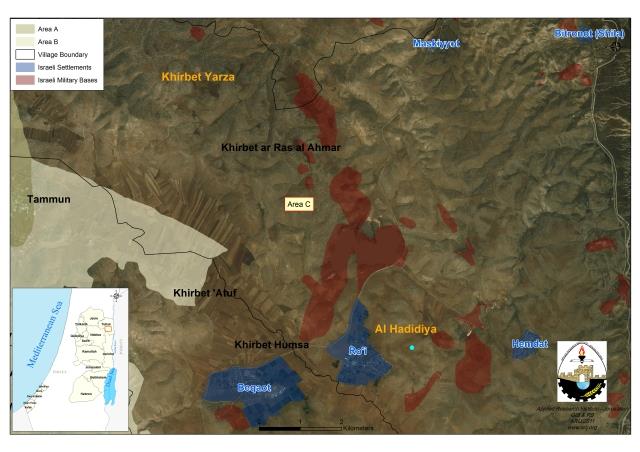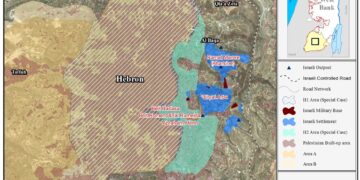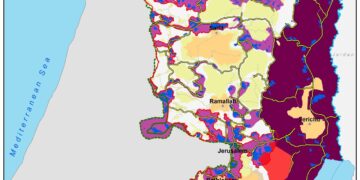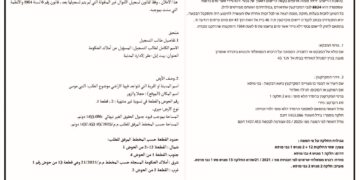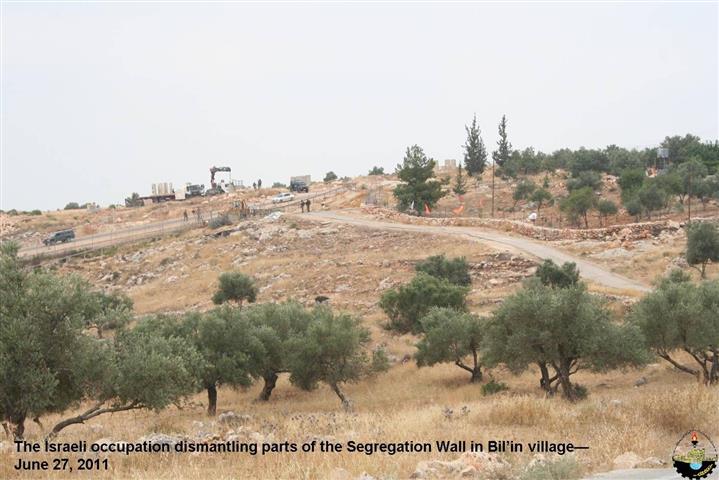The Israeli Army Forces are moving forward with a systematic campaign against the Palestinian residents of the Jordan valley where it launched a wave of demolitions for their houses and structures under Illegal pretexts mainly for pushing them to voluntary leave their own lands.
On June 21, 2011, the Israeli Army bulldozers accompanied with number of Israeli Army vehicles stormed Khirbet Yerza Bedouin community east of Tubas city in the northern parts of the Jordan valley, and demolished three residential barrackses, tent, and two animal shelters owned by the local resident Fayez Hamed ‘Abed Daraghmeh under the pretext of lacking building permits, where 13 people family became displaced and without shelter.
It is worth mentioning thaton the early morning of Jun 1, 2011, dozens of Israeli military vehicles stormed Khirbet Yerza east of Tubas city on the northern parts of the West Bank and forced the local residents to evacuate the entire community to pave the way for the Israeli Army to execute a military exercises on their lands.
Khirbet Yerza had been subjected many times for systematic eradication where on February 9, 2011, the Israeli Occupation Forces verbally notified a number of Palestinian families in Khirbet Yerza in Tubas Governorate in the northern Jordan valley of their intention to destroy their 18 residential barrackses, tents, animal barns and fodder stores at any time. The Israeli Occupation Authorities has for several times warned residents of Khirbet Yerza to evacuate the area under the pretext that it is a ‘closed military area’ and residents are not allowed to continue living in it.
Khirbet Yerza is a Palestinian community located 6 km to the east of Tubas city, in the north-eastern part of Jordan Valley. It is bordered by Al Malih community to the east, Al ‘Aqaba village to the north, Tubas city to the west and Al Buqai’a Valley area to the south.
In the same day the Israeli Army bulldozers stormed Al-Hadidiya community southeast of Khirbet Yerza and demolished 29 structures: seven residential tents, 18 animal barrackses and four outdoor kitchens. Among the owners the following were known: Abdullah Hafez Bani ‘Odeh, Saleh Youseph Bsharat, Abdel Rahim Hussein Bsharat and ‘Ali Mohammad Bsharat, where they indicated that the owners of the targeted structures had received military demolition orders in June 16, 2011, with three days time deadline to evacuate the area and to demolish their own structures and they filed a petition to the Israeli Civil Administration in order to postpone the demolition but the request had been denied. It should be noted that on June 10, 2011, the Israeli Army demolished one residential tent and three animal shelters for the local residents under the pretext of lacking building permits.
Al-Hadidiya community is located in Al Buqai’a plain east of Tubas Governorate, in the northern parts of the Jordan Valley. The area located was declared ‘closed military areas’ right after the Israeli Occupation of the Palestinian Territory in 1967. Since that time, the Israeli occupation Army adopted an organized systematic policy to restrict access to the entire Jordan valley area, by which, the Israeli Army could control the development of land and the built-up areas there.
Al-Hadidiya community has a population of around 231 residents (PCBS 2010) and is located about 33 kilometers east of Tubas city. It is bordered by Pellas Illegal Israeli settlement from the north, Al-Jiftlik village from the south, the Illegal Israeli settlements of Beqa’ot and Ro’i from the west and Hemdat Illegal settlement from the east as well as the Israeli bypass road# 90. See the map below:
It is worth mentioning that Al-Hadidiya and Khirbet Yerza communities are both surrounded by the Illegal Israeli settlements of Beqa’ot, Ro’i and Hemdat, in addition to many Israeli military bases, which adds to the Palestinian residents anguish and misfortune, because of the Israeli Army and the settlers’ daily and regular harassments. See the table below:
|
Table of the Illegal Israeli Settlements located in the vicinity of Al Hadidiya & Khirbet Yerza In Tubas Governorate
|
|
Colony Name
|
Location
|
Date Establishment
|
Population
|
Area-Dunums
|
|
Mehola
|
Tubas
|
1968
|
362
|
1759
|
|
Beqa’ot
|
Tubas
|
1972
|
156
|
2284
|
|
Ro’i
|
Tubas
|
1976
|
117
|
1573
|
|
Shadmot Mehola
|
Tubas
|
1978
|
516
|
1291
|
|
Hemdat
|
Tubas
|
1980
|
140
|
317
|
|
Rotem (Nahal)
|
Tubas
|
1984
|
18
|
51
|
|
Masskeyyott
|
Tubas
|
1987
|
NA
|
47
|
|
Total
|
*****
|
*****
|
1309
|
7322
|
|
Source : ARIJ Database 2011
|
Conclusion
The Israeli appropriating of more than 95% of the Jordan Valley area while cleansing the Palestinians from the remaining 5% area is reflecting the Israeli colonial approach based on the eradication of the others where more than 58,000 Palestinian residents of 44 Palestinian localities in the Jordan Valley are deprived from the simplest elements of a decent life while 13,000 Israeli settlers living in 32 Illegal Outpost and 38 settlements enjoying luxurious life in their houses with all of the infrastructure ,roads, security, facilities …….etc.
Under the International Law Rules and Conventions, Israel, as an occupying power, and is prohibited from destroying or seizing the Palestinian lands and properties, unless such acts are justified by security needs and as long as they are carried out on temporary bases.
-
Article 53 of the Fourth Geneva Convention of 1949 provides that: Any destruction by the Occupying Power of real or personal property belonging individually or collectively to private persons, or to the State, or to other public authorities, or to social or cooperative organizations, is prohibited, except where such destruction is rendered absolutely necessary by military operations.
-
Art. 23 of the Hague Convention of 1907 also provide: In addition to the prohibitions provided by special Conventions, it is especially forbidden to destroy or seize the enemy’s property, unless such destruction or seizure be imperatively demanded by the necessities of war;
-
Also the Universal Declaration of Human Rights, the 10th of December 1948, General Assembly Resolution 217/A/III, Article 17 stated: ‘No one shall be arbitrarily deprived of his property.’ Which means it bans Israel from destroying or confiscating the property of the Palestinians at any case’.
-
Moreover, the International Covenant on Civil and Political Rights (ICCPR) – Property (ICCPR, article 1) provides that: All peoples have the right of self-determination. By virtue of that right they freely determine their political status and freely pursue their economic, social and cultural development.
-
The International Covenant on Economic, Social and Cultural Rights (ICESCR) – Food (ICESCR, art. 11): The States Parties to the present Covenant recognize the right of everyone to an adequate standard of living for himself and his family, including adequate food, clothing and housing, and to the continuous improvement of living conditions. The States Parties will take appropriate steps to ensure the realization of this right, recognizing to this effect the essential importance of international co-operation based on free consent.


